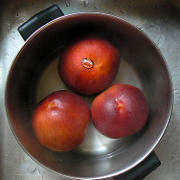|
Home
|
Nov 20, 2017
This week’s themeWords that have changed This week’s words parboil notorious vedette acerate egregious 
Parboiling peaches
Photo: Benny Mazur
A.Word.A.Day
with Anu GargWe are born, we grow, and we die. Something similar happens with words. Someone gestates an idea in the womb of his mind and then delivers it in the form of a word. This begetting of a word is known as coining. With time a word grows up. It changes its values. It appears in a new hairstyle or gets a new religion. OK, maybe not that, but it changes its spelling, meaning, or pronunciation. Sometimes all three. This is difficult for many people to accept. They are used to looking at a word in a certain way and do not appreciate when it appears in a new garb. Words can die too. We call such words obsolete. This week we will focus on words that have changed over time. parboil
PRONUNCIATION:
MEANING:
verb tr.: To boil partially; to cook partly by boiling.
ETYMOLOGY:
From Anglo-Norman parboillir/perboillir (to cook partially by boiling,
to cook thoroughly by boiling), from Latin perbullire (to boil thoroughly),
from per- (thoroughly) + bullire (to boil). From misinterpretation of par-
with part, the meaning of the word changed from “to boil thoroughly” to
“to boil partially”. Earliest documented use: 1381.
USAGE:
“‘Leave the grilling for later. Please?’ ‘Yes, of course -- perhaps I should parboil my questions?’” Andrez Bergen; Who is Killing the Great Capes of Heropa?; Perfect Edge; 2013. See more usage examples of parboil in Vocabulary.com’s dictionary. A THOUGHT FOR TODAY:
If you want a symbolic gesture, don't burn the flag, wash it. -Norman
Thomas, socialist and social reformer (20 Nov 1884-1968)
|
|
Subscriber Services
Awards | Stats | Links | Privacy Policy
Contribute | Advertise
Awards | Stats | Links | Privacy Policy
Contribute | Advertise
© 1994-2026 Wordsmith